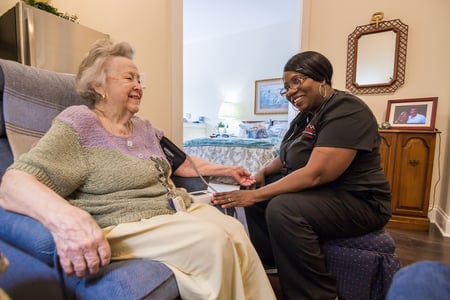
Good nutrition is vital in promoting health and wellness at any age but is especially important for older adults, whose weaker immune systems make them more vulnerable to certain illnesses and conditions. And while this is true, malnutrition remains a common concern for many older adults—whether it’s due to physical changes that hinder their ability to eat or simply a loss of appetite.
Loss of appetite is prevalent for many older adults. It can contribute to weight loss and nutrition deficiencies and lead to poor health choices. At Brickmont Assisted Living, our assisted living communities throughout Atlanta promote healthy eating habits in our residents and guests. We’re sharing some information on the loss of appetite in older adults and how to handle this common issue.
What Causes Loss of Appetite in Older Adults?
A variety of reasons may be responsible for a loss of appetite or inability to eat, including age itself. Some other factors may include:
- Typical physiological changes that come with aging
- Problems or pain with teeth or dentures
- Side effects of certain medications
- Various illnesses and diseases
- Conditions that impact motor movement
- Depression, loneliness, or isolation
Strategies for Promoting Better Appetite
Once you’ve understood how certain psychological and physical factors may cause loss of appetite, you can develop a solution on how to encourage a healthy and nutritious diet for your parent or family member. Here are some ideas:
1. Find the Underlying Cause
While sometimes there may not be one specific factor causing the loss of appetite, other times there might be. The first step in combatting loss of appetite is determining any underlying health causes that could be affecting their ability to eat. If it’s an oral health concern or a medication side effect, speak with a healthcare provider about possible solutions. If a physical disability is hindering their ability to eat, talk with a therapist about potential ways to remedy that.
2. Keep a Routine
If there is no physical deterrent and your family member is merely experiencing a loss of appetite, try serving meals at a set schedule throughout the day. Keeping a routine is essential for older adults, especially those with dementia or Alzheimer’s disease. By serving breakfast, lunch, dinner, and snacks at the same time every day, your family member will be more likely to eat as their body is ready and expecting food at those times.
3. Pack in Nutrients
You may not be able to control how much your parent or family member eats, but you can ensure that they’re receiving plenty of nutrients in what they are eating.
If you can’t get your family member to eat a sufficient portion of food, try serving smaller amounts of nutrient-dense foods. Instead of a big plate of pasta or a large sandwich, serve smaller and denser portions of protein, healthy fats, and whole grains. Some options include peanut butter and crackers, avocado, a handful of nuts, or a hard-boiled egg.
4. Make Mealtime Social
Depression, loneliness, and anxiety have all been known to contribute to the loss of appetite in older adults. In these situations, eating alone can feel more like a chore than a social activity.
By making mealtime a fun and social experience, your family member may eat more than they realize because they are focused on something other than the act of eating. Visit your family member for meals whenever you can, and recruit friends, neighbors, and church members to do so when you can’t.
5. Let Them Participate
No one likes to be told what to do, even if that thing is eating! If you set down a plate of food in front of your family member and tell them to eat, they may be less inclined to than if they chose the foods themselves. Involve them in the meal planning process and, if they are able, the preparation process. Giving them the choice (even if it’s just between two or three things) will empower them and increase the possibility of enjoying their food. And if they decide they want a brownie after dinner, let them have one! It’s more than okay to treat yourself every once in a while.
Bon Appetit!
It can become concerning when you realize that an older loved one is not eating enough. By understanding some of the reasons behind loss of appetite in older adults and some ways to combat it, you can ensure that your family member is getting proper and sufficient nutrients.
At Brickmont Assisted Living, our Atlanta assisted living communities ensure that dining is a valued, social, and enjoyable experience. Our chefs work closely with residents and a registered dietitian to ensure our menus are healthy, well-balanced, and delicious. For more information on senior health and nutrition, visit our blog!




.png)